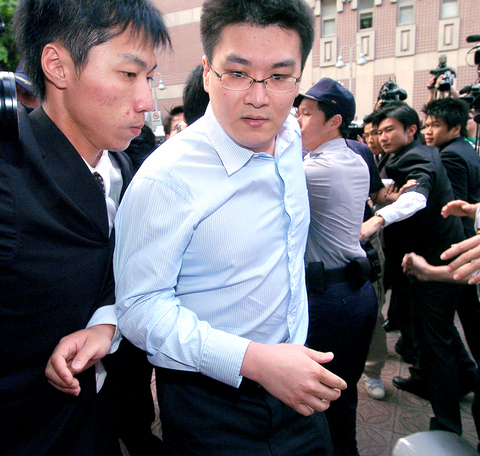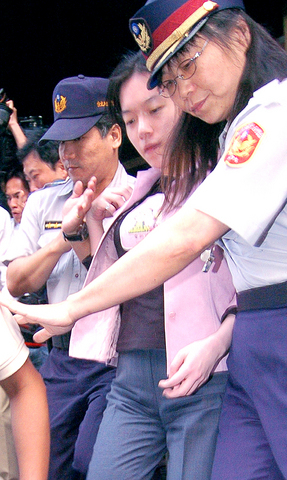The Taipei District Court yesterday released the president's son-in-law, Chao Chien-ming (趙建銘), on NT$17 million bail (US$518,900) after the Taiwan High Court asked it to review its decision to grant bail to Chao.
On Monday, the high court asked the Taipei District Court to review its decision last week to grant bail to Chao, along with former Taiwan Development Corp (TDC) chairman Su Teh-jien (蘇德建) and businessman Yu Shih-yi (游世一).
Chao's wife, Chen Hsing-yu (陳幸妤), attended yesterday's hearing, making her first public appearance since giving birth to their third son earlier this month.

PHOTOS: WANG MIN-WEI, TAIPEI TIMES
Prosecutors said they were concerned that Chao might flee the country to avoid trial since he had booked a flight to Japan last month after the scandal broke and a few suspects have been summoned for questioning.
Yesterday morning Chen Hsing-yu issued a statement saying "the plan to take a trip to Japan was my idea, not Chao's. I was annoyed about the media reports saying my mother [first lady Wu Shu-jen (吳淑珍)] was involved in the Sogo Department ownership struggle, so I decided to travel abroad with my husband."
She added that Chao had never planned to flee the country.

Prosecutors had hoped the three defendants would be ordered into custody again, but if the judges decided to let them remain then at least the amounts of their bonds would be increased.
The hearing began at 4pm and lasted about two hours. At 7pm, the judges decided to allow Chao to remain free, but increased his bond by NT$17 million.
They did not raise the bail for Yu or Su. Yu was freed last week on NT$10 million bail, while Su's was NT$5 million.
Chao was indicted a week ago Monday -- along with his father, Chao Yu-chu (趙玉柱), and three others -- for violating the Securities Transaction Law (證券交易法).
The scandal dates back to last summer, when Su and Chang Hwa Commercial Bank officials dined on two occasions with Chao Chien-ming and Yu at a Japanese restaurant in Taipei. Prosecutors believe they discussed confidential information about TDC.

A Ministry of Foreign Affairs official yesterday said that a delegation that visited China for an APEC meeting did not receive any kind of treatment that downgraded Taiwan’s sovereignty. Department of International Organizations Director-General Jonathan Sun (孫儉元) said that he and a group of ministry officials visited Shenzhen, China, to attend the APEC Informal Senior Officials’ Meeting last month. The trip went “smoothly and safely” for all Taiwanese delegates, as the Chinese side arranged the trip in accordance with long-standing practices, Sun said at the ministry’s weekly briefing. The Taiwanese group did not encounter any political suppression, he said. Sun made the remarks when

The Taiwanese passport ranked 33rd in a global listing of passports by convenience this month, rising three places from last month’s ranking, but matching its position in January last year. The Henley Passport Index, an international ranking of passports by the number of designations its holder can travel to without a visa, showed that the Taiwan passport enables holders to travel to 139 countries and territories without a visa. Singapore’s passport was ranked the most powerful with visa-free access to 192 destinations out of 227, according to the index published on Tuesday by UK-based migration investment consultancy firm Henley and Partners. Japan’s and

BROAD AGREEMENT: The two are nearing a trade deal to reduce Taiwan’s tariff to 15% and a commitment for TSMC to build five more fabs, a ‘New York Times’ report said Taiwan and the US have reached a broad consensus on a trade deal, the Executive Yuan’s Office of Trade Negotiations said yesterday, after a report said that Washington is set to reduce Taiwan’s tariff rate to 15 percent. The New York Times on Monday reported that the two nations are nearing a trade deal to reduce Taiwan’s tariff rate to 15 percent and commit Taiwan Semiconductor Manufacturing Co (TSMC, 台積電) to building at least five more facilities in the US. “The agreement, which has been under negotiation for months, is being legally scrubbed and could be announced this month,” the paper said,

Japan and the Philippines yesterday signed a defense pact that would allow the tax-free provision of ammunition, fuel, food and other necessities when their forces stage joint training to boost deterrence against China’s growing aggression in the region and to bolster their preparation for natural disasters. Japan has faced increasing political, trade and security tensions with China, which was angered by Japanese Prime Minister Sanae Takaichi’s remark that a Chinese attack on Taiwan would be a survival-threatening situation for Japan, triggering a military response. Japan and the Philippines have also had separate territorial conflicts with Beijing in the East and South China